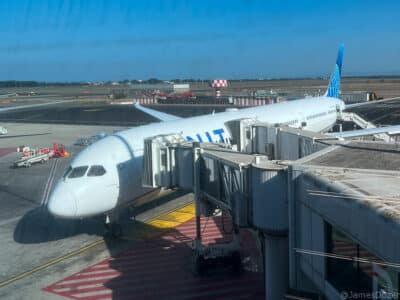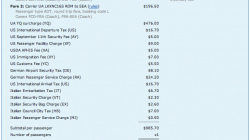I know many people have come to visit this blog because they see my posts in the “Trick It!” thread on MilePoint. In fact, one of the reasons I started Hack My Trip was because I usually get a few messages every week from people asking if I have any insight into how to get started on fuel dumping or if I know of a 3X that will work on their desired itinerary.
I don’t know if this post will encourage or discourage those people, but I want to make it clear that I realize this subject has complicated ethical implications. It exists in a legal gray area, and the amount of effort required for a payoff makes many existing members of this group concerned about how open we should be to training new people.
Fuel dumping is a method by which a fuel surcharge on an international fare is removed through the addition of one or more additional unrelated segments. Because of IATA (International Air Transport Association) rules that few people understand completely, the combination of certain flights and carriers causes the fuel surcharge to be all or partially eliminated. Although you still have to pay for the additional segment (called a “3X” or “third strike” because it is the third flight and you “strike” it by not flying) the added cost of a good 3X is much less than the savings of not paying for a fuel surcharge of $300-500.
This is one of the most challenging tricks out there, and it doesn’t help that so much of the information people share online is in code, so let me address each of those concerns and explain the reason why I persist in helping people get started in this field. I am doing this now to prepare you for when I start to explain fuel dumping more thoroughly, probably in February. Everything I’m posting before that time, such as the instructions on using ITA last week, are part of your preparation.
That doesn’t mean you can’t use those tools for ordinary travel, too, but we all know not to put inexperienced drivers behind the wheel of a sports car. 😉
First, fuel dumping is difficult because you are essentially using the airlines’ automated computer systems against them. When fares involving several airlines are automatically priced and ticketed, there are rules about which one of those airlines is responsible for collecting the revenue. This airline then doles it out to the other airlines on which you actually fly.
Fortunately for us, the ticketing airline gets to decide whether it wants to collect that fuel surcharge. Airline X might assign a $100 base fare and $400 fuel surcharge, but if airline Y collects the money, it might only charge $100 for that portion of the itinerary, and that’s all it has to hand over.
The rules for assembling a tricked itinerary are not as clear as you might think, and many times when you find a 3X that ought to work it can raise the base fare by pushing you into a different fare class due to restrictions on fare combinability. Even if the 3X successfully removes the fuel surcharge, a higher base fare is going to void some or all of the savings.
Anyway, we’ll get to how to create a tricked fare in later weeks. What I really need to discuss is the importance of the secrecy.
DesertRose, another major contributor to fuel dumping education on MilePoint, pointed out a schism in how different people view maintaining a shroud of secrecy and exclusivity:
Group 1: People who regard FDs as an elaborate set of tools and knowledge to be earned through work and preserved from outsiders.
Group 2: People who think tricks are like error fares, something posted by a miracle and then exploited until it’s gone.
I argue that neither of these approaches is healthy. Group 1 creates a hostile elite class that discourages new entrants because it dilutes the pool of rewards. People are expected to become experts on their own and then join the group as a full-fledged contributor. Group 2, however, would quickly drain that pool of rewards faster than it can be replenished. Overexploited tricks are quickly identified and shut down, which is why Group 1 works furiously to maintain the secrecy lest anyone from Group 2 (usually less experienced people) figure out what’s going on and start sharing indiscriminately.
It’s a form of class warfare, and what we are faced with is a tragedy of the commons. Fuel dumping can be a lucrative endeavor for everyone as long as the practice is controlled and not overused.
Secrecy and codes are used to make it harder for non-contributors to swoop down and seize the deals without bothering to learn anything about how the process works. We don’t want people to search on Google for “cheap fare to Europe” and find a thread where it spells out exactly which flights and carriers to use for a $250 ticket to Paris.
Make no mistake, the airlines know about what we’re doing, and they could kill the practice easily if they really wanted to (they’ve killed tricks overnight in the past). The reason they don’t is either because they haven’t identified which particular fares are being dumped at any given time or because it isn’t worth the effort to save a few thousand dollars a month. This is a game of Whac-A-Mole. They will certainly notice and care if it any particular trick rises above the rest and stays there long enough to be hit on the head.
Unlike a mistake fare, which is only good on that specific fare and SHOULD be exploited and shared by everyone before it disappears, a good trick can be used on many different fares and can survive for months or years. If the 3X is overused, however, it will no longer be good for anyone. A good collection of 3Xs should be tended and cared for like a garden.
Code is used in online forums, such as claiming you were able to use “The Spruce Goose” to dump 80% YQ from C1-C2. Usually a cute name is all you get to figure out the fuel dump, but it’s not much harder than The New York Times’ Sunday crossword puzzle. As for C1-C2, those are continent codes. Because the 3X is often valid on several city pairs, all the information you really need is that it’s good on flights between the U.S. (C1) and Europe (C2). “YQ” or “YR” is the code airlines use to denote the fuel surcharge. Maybe the trick only works on a few city pairs, but the poster has narrowed it down enough that you can find it. If you can’t afford to spend some time figuring out the code, then you must be making $200 per hour at the office.
This code is enough to fool Google and the people who are just looking for a random cheap fare. Should one of them come across it, they won’t understand it and will move on—just like I did when I first stumbled across FlyerTalk’s fuel dumping thread in 2009. If you are serious about learning to fuel dump like a pro, you’ll have patience and stick it out, which I later did in 2010. At 16,500 posts and counting, it’s a long read, but I’ve done it. MilePoint is much friendlier, but I will admit that FlyerTalk is the expert version.
As for helping others, I strongly believe that adding people to the group will help develop more and better 3Xs. I also strongly believe that those who are included need to respect the efforts of those who came before them. For this reason, there are some rules you must follow to play this game:
- Don’t call the airlines! We don’t care if you want a seat assignment, an upgrade, or need to handle a schedule change. You should expect that an agent would see what you’ve done, cancel your ticket, and kill the deal. If you can process a seat assignment or upgrade online (like a United systemwide upgrade) that’s okay, but do not let anyone from an airline see what you’ve done. If you need to rebook, sorry, your money is gone. I don’t know of any people who have successfully rebooked or refunded a dumped itinerary because that means talking to an agent.
- Don’t call the airlines! Do I really need to repeat myself?
- If someone yells “stop!” pay attention and edit your post as appropriate. Discussions can get VERY heated on these forums, and when you’re in the business of trading secrets, you don’t want any enemies.
- Use code so that you don’t expose other people’s tricks. For all you know, someone else already published it using a code you couldn’t figure out, so even if you think you found something novel, don’t risk the chance that you’re wrong.
- Don’t use code when you ask questions. As long as you’re not revealing sensitive information, it’s quite fine to ask for help tricking a fare from New York to London. That’s not hurting anyone, and no one wants to spend time figuring out what you’re trying to ask. But if you wish to mention the tricks you’ve already tried, make sure those are still coded.
I hope this post makes clear what you can expect from me when I start to discuss fuel dumping. I will help you get started, showing you how to look for a 3X and assemble and book a dumped itinerary. However, I won’t be sharing any working tricks. This is an instructional guide ONLY! People will learn one way or another and should learn to do it right so it doesn’t ruin the game for the rest of us. At least, that’s what I hope will happen. It’s always a pleasure to see people who get some early help succeed beyond your expectations and become a frequent contributor to the group discussion. More often people reach a competent but less spectacular level of ability.
Readers, what do you think about my philosophy? I’m always open to suggestions because, as I’ve said, this is a shared resource. I don’t think you can convince me not to share anything, but it’s always useful to know where people draw the line.



